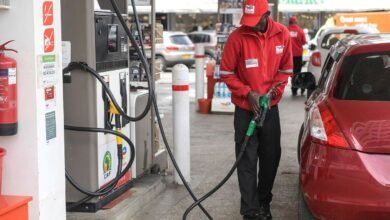
It is a sign of relief for Kenyans after Interior Cabinet Secretary Dr. Fred Matiangi said there would be a downward revision of fuel prices in the next review.
Kenyans are currently experiencing a high cost of living exacerbated by this month’s review that saw a litre of Petrol go up by Ksh.7.58 to retail at Ksh.134.72.
The Energy Petroleum and Regulatory Authority (EPRA) reviews fuel prices 15th day of every month. The price fluctuate based on the performance of the global oil market.
Two Kenyans moved to court on September 21 to petition EPRA and Kenya Revenue Authority (KRA) over recent hiked fuel prices.
According to Isaiah Odando and Wilson Yata, the government failed to consider common citizens at a time when the economy is reeling from the coronavirus effects.
Other respondents in the case are National Assembly and petroleum Cabinet Secretary.
Among the orders they are seeking is to quash the decision by the KRA Commissioner General to adjust excise duty rates for petroleum products effective October 1, 2021 subject to approval by the Cabinet Secretary and the National Treasury.
According to the petitioners, the respondents have ignored proper public participation of Kenyans before adjusting the rates.
They further argue that Kenyans have been subjected to heavy fuel tax notwithstanding that they are already overburdened.
“The respondents have failed to be transparent and accountable to Kenyans on information as to why Kenyan fuel price retails higher as compared to its landlocked neighbors and has tax higher than the landed price of fuel,” read court papers
CS Matiangi also said they are chasing time to implement President Uhuru Kenyatta’s order to reduce the cost of power by December 31, 2021.
“Work has started now to ensure we reduce the cost of power, We were given 90 days, we have begun that task today. Our bills are too high. Effective now we have suspended any negotiations on any new Power Purchase Agreements” said Matiangi.
The cost of reduction will be achieved through the reduction of the consumer tariffs from an average of Ksh.24 per kilowatt-hour to Ksh.16.
Also Read:
- Kenyans to enjoy cheaper electricity starting December
- BAT crowned this year’s overall winner of annual energy management awards
- Rabai Power denies dealing with EPRA and KPLC in recent hiked cost of energy
This is after the President received the Report of the Presidential Taskforce on Review of Power Purchase Agreements which was constituted to respond to calls from a wide cross-section of Kenyans to address concerns about the high cost of electricity for both individual consumers and enterprises.
Inside the report, it was established that there was a vast differential between KenGen and Independent Power Producer (IPP) tariffs and electricity dispatch allocations.
There was also the lack of proper demand forecasting and planning, leading to irreconcilable projections as against demand, the existing risk allocation imbalances between KPLC and IPPs were further exacerbated by poor contract management frameworks.
It was also established that there was an uncoordinated institutional architecture that inadvertently contributes to enhanced operational costs passed on to consumers.
Out of this finding, the President has directed for the reduction of the cost of electricity by over 33 percent within four months.
“The consequence of the proposed interventions is that a consumer who previously spent Ksh. 500 per month on electricity shall by 31st December, 2021 pay Ksh.330 per month. This cost reduction will be achieved through the reduction of the consumer tariffs from an average of KES 24 per kilowatt hour to KES 16 per kilowatt hour which is about two thirds of the current tariff,” said President Kenyatta through State House Spokesperson Kanze Dena.





